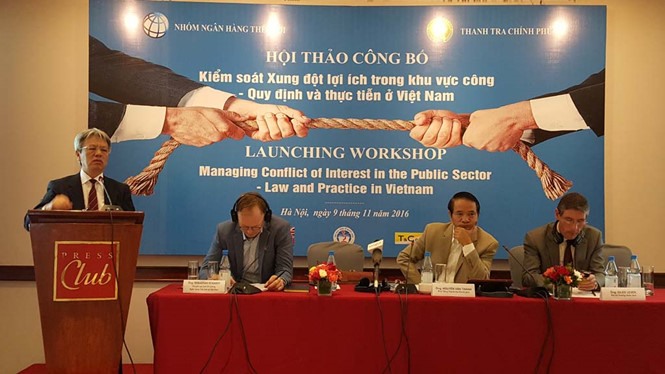 Society
Society

Việt Nam can improve public-sector integrity and efficiency by strengthening laws addressing conflicts of interests, according to a report conducted by the Government and the World Bank, with support from the United Kingdom Government.
 |
| Việt Nam can improve public-sector integrity and efficiency by strengthening laws addressing conflicts of interests, according to a report conducted by the Government and the World Bank, with support from the United Kingdom Government. — Photo thanhnien.vn |
HÀ NỘI – Việt Nam can improve public-sector integrity and efficiency by strengthening laws addressing conflicts of interests, according to a report conducted by the Government and the World Bank, with support from the United Kingdom Government.
The report titled ‘Managing Conflict of Interest in the Public Sector – Law and Practice in Việt Nam’, says: “Việt Nam has made great progress in socio-economic development over the past three decades.”
“But the transition from the central economic planning to a market-oriented system boosted interactions between the public and private sectors, making it necessary to address the growing likelihood of conflicts of interest by better laws and implementation of policies”.
These conflicts are not a new concept in state governance, said the report.
Conflict management was closely linked with public cadre ethics, accountability, and integrity. Together, these measures create an environment that encourages good public sector performance while tackling corruption.
According to the report, the conflicts of interests (COI) included gifts giving, nepotism, and using insider information for personal gain.
“The study was a first attempt to put conflict of interest issues into perspective in Việt Nam," said Deputy Inspector General Nguyễn Văn Thanh said.
“The ultimate objective of the study was to recommend measures for the Vietnamese Government and relevant stakeholders to be aware of and minimise conflict of interests encountered by public servants in their work, improve the quality of the public sector, and better prevent corruption” Thanh said.
The 144-page report offers a comprehensive examination of the prevalence of conflict of interest in six types of activities in the public sectors: public service delivery; recruitment; procurement; licensng and project approval; inspection and auditing; and handling of violations.
It included a survey of citizens, businesses and government workers that showed an increasing societal demand for more transparency and integrity in public institutions.
“Việt Nam aspires to become a prosperous country with modern institutions by 2035”, said Ousmane Dione, the World Bank Country Director for Việt Nam.
“Managing conflicts of interest was essential to this aspiration, as it helped determine how state and market institutions, rules, and regulations are shaped for the next generation”, Dione said. — VNS




